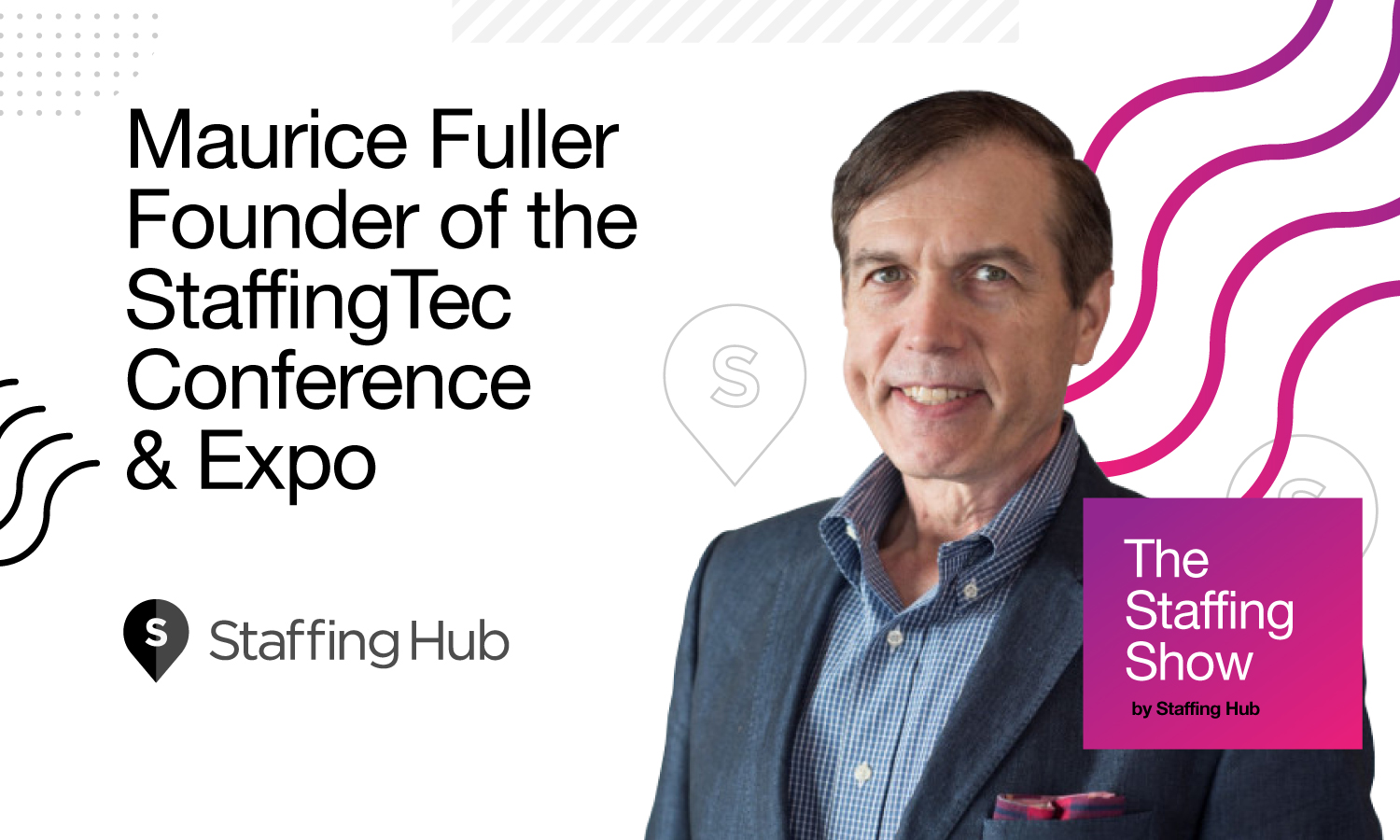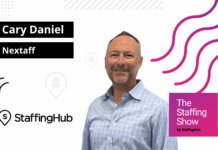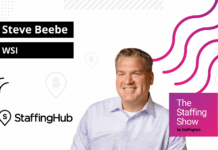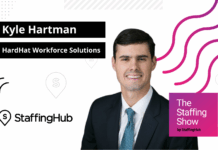
In this episode of The Staffing Show, David Folwell, President of StaffingHub and Staffing Referrals, interviews Maurice Fuller, founder of the StaffingTec Conference and 25-year veteran of the industry. They talk about how staffing firms can keep up with the digital transformation and the top tech trends that will define the next decade.
StaffingHub: I’ve got Maurice Fuller here from StaffingTec, whose been a frequent guest on StaffingHub Live. Super excited to have you on the podcast today. Today, we’re going to cover quite a few things. Going to be going over some technology trends, talking about his upcoming conference, and really digging into what’s next for staffing firms. To start off, why don’t you do a little… You’re familiar on the podcast, but maybe a little introduction of yourself, Maurice, and then we’ll jump into a few questions.
Fuller: Thank you, David. I’m Maurice Fuller, I’m the founder and producer of the Staffing Tech Conference. I’ve been in the staffing industry now for a quarter decade, 25 years. I worked directly in the industry for 18 years in leadership roles for large staffing firms. Heavily involved in technology and operations. And then I launched my own firm a few years ago. Focused on consulting, training, and now focused on the Staffing Tech Conference. And also helping staffing firms select the best technologies and solutions.
StaffingHub: Awesome. Thanks so much. And with that, let’s go ahead and jump right in. I know, as most of our listeners are experiencing, the staffing industry is changing at a more rapid pace than ever before, and I know, Maurice, you have your finger on the pulse of what those top trends are. If you could just shed a little bit of light on what you’re seeing in terms of top trends that staffing firms should be aware of.
Fuller: Yeah, we recently published a paper on the Top 10 Staffing Technology Trends for 2020, and I can quickly go through them. I think some of these trends are more important than others, and I’m going to point out which ones really matter. Let me run through the list quickly, and then we’ll circle back and talk about some of these individually.
- Mobile Apps
- Conversational Systems and Chatbots
- AI and Machine Learning
- Digital Marketing
- Enterprise Business Intelligence
- Advanced Communications
- Intelligent Process Automation
- Digital Engagement
- Autonomous Staffing
- Blockchain
If I go through this list and I think about the ones that are really going to change the industry in the years ahead. For sure, the need of mobile apps is a really, really big deal for our industry. Chatbots are huge, that’s coming along quickly. AI and machine learning is going to be everywhere. We think every application that staffing firms will be using in 2025 will be infused with AI. Digital marketing is super important.
Intelligent process automation, automation is a really big deal. We just saw the acquisition of Herefish by Bullhorn. Now that Bullhorn is owning Herefish, automation is going to become incredibly pervasive over the next several years. I think it’s going to be a solution that Bullhorn will push really hard.
Digital engagement is a huge trend, and you’re very active in that with Staffing Referrals. That’s exactly the kind of tool that’s driving significant ROI.
Autonomous staffing, this is a huge trend. This is where staffing firms basically fill orders autonomously without any human intervention. A customer puts in an order, and through the automation, it contacts potential candidates, the candidates respond, and it will take the candidates that are interested, take them through an onboarding process, and automatically hire them. We think by the end of the decade a third of all positions will be filled autonomously.
And then the last one is blockchain. We did the first blockchain conference for the staffing and recruiting industry. Very interesting, that area continues to evolve. You may not see very much in terms of blockchain these days, the excitement and the hype is dimmed down a bit but there are many, many developers that are actively using blockchain right now in a wide range of contexts. Including payments. Including background checking. These things are in development and they will emerge in a huge way during the 2020s.
StaffingHub: That’s fantastic. That’s a great overview. And with the autonomous placements, I kind of put that into the, conceptually, as the gig economy concept and looking at Uber and Lyft, Uber Work. Are you seeing any staffing firms or do you have any examples, uses cases, case studies of companies that you think are doing a really good job on the autonomous placement? I also agree that that’s going to be where we’re moving, is continuing to automate anything that is not a value-add in terms of building a relationship with the candidate, I think is going to be automated as quickly as possible. Do you have any examples of that or seeing anybody that’s doing that really well?
Fuller: Without naming specific staffing firms that are doing this, there are more and more staffing firms. I’ve talked to these owners that are filling, let’s say 80% or even 100% of their orders, autonomously. These are being done primarily through mobile apps. Mobile apps and autonomous staffing work hand in glove.
They are companions in delivering these kinds of autonomous services. That’s something I want to talk to you about a little bit.
The next big battleground within the staffing industry is going to be happening on the mobile phone, the mobile app, and that relationship that candidates have and employees have with their staffing firm, through their mobile phone, through that mobile app, is incredibly valuable.
I’m seeing companies that are very, very narrowly focused. Let’s take healthcare staffing. Take a very narrow specialty. That’s all they do. They do it through a mobile app and they fill a large number of their orders autonomously. In the light industrial and clerical space, you’ll see that as well. But it takes a technology like, let’s say Work In or Shift Gig, for example, in order to implement that.
Another interesting development that’s happening is the acquisition by Bullhorn of Erecruit. And along the way they acquired some mobile technology. We can see Bullhorn also becoming involved in the mobile space in the not too distant future.
StaffingHub: I actually think it’ll be Bullhorn’s acquisition of Herefish. But then also it’s kind of like HubSpot, started off on the automation front and then built their CRM. You’re seeing those combinations more and more. I really think with Bullhorn purchasing Herefish, they’ve got the automation on the marketing and digital-intelligence front.
Selfishly, at Staffing Referrals, we’re trying to automate the entire referral management process as well. And then I think when you look at that, tie that to the mobile app, and the autonomous placements– the ecosystem is changing very rapidly, and it’s fun to watch, but it’s going to be interesting to see who pieces the puzzle together correctly to win.
With that, I’m going to jump next to what are some of the major challenges that you see on… And I didn’t mean to cut you off if you have more to say on that, but I was just going to ask what challenges you’re seeing staffing firm space.
Fuller: Well, the biggest challenge is just making sense of all of this technology.
StaffingHub: Have you seen anybody that you think is… any models? You and Staffing Tech, I would put at the forefront of helping staffing firms solve some of those problems by getting the technology vendors out front, trying to organize it and categorize it. How else would you suggest people go about solving that?
Fuller: Going back to this point about being overwhelmed with so much technology.
[Technology is] coming along at a very, very rapid clip, and many staffing firms aren’t really prepared for the rate at which new technology is coming along.
It’s really about making sense of all the different opportunities that are out there and where the ROI is, but then also putting that into the context of an overall strategy for the staffing firms.
For example, let’s say that your focus is on light industrial and clerical, you probably want to be thinking very seriously about mobile apps, and you’re future around mobile apps. Who are the suppliers that are going to help you get there with mobile apps? And then how do you build a cohesive, comprehensive strategy for your staffing firm around mobile apps?
That’s a massive shift for a lot of staffing firms to undertake. It will change the dynamics within your company in a major way.
Staffing firm leaders need to think big, they need to prepare for massive change to survive and thrive as we move forward.
There’s just so much happening all at once and staffing firms are not really used to adopting technology at the rate at which they need to be doing in the future. With the acceleration of technology doubling in the next decade compared to the previous decade, we have to double down on the investments that we’re making.
But then also, again, looking at the entire landscape, looking at your firm’s strategy, and putting everything into context and then prioritizing in a logical way how you’re going to deploy your investments and your resources to take your firm into the future.
StaffingHub: Yeah, I completely agree. And I know one of the things that you talk about — as staffing firms are trying to solve their tech stack strategy, trying to figure out how they’re going to implement this, they’re implementing automation. I’ve heard you mention framework, which I think is wonderful. Looking at people process technology and accountability. How do you think organizations should go about approaching making sure they’re going to tackle these challenges effectively?
Fuller: Thanks for mentioning that. It’s not just the technology. There’s so much great technology that’s coming along. I think that’s the challenge: how do you move the organization forward and what is your company going to look like after you start implementing some of these technologies?
For example, I mentioned autonomous staffing. What does your organization look like if a significant percentage of your orders are being filled autonomously without recruiters? That means that your team is more productive. That means that your commission structure might change. That means that the kind of metrics that you’re going to be looking at going forward will be different. Your dashboards will be different. And the role of salespeople and recruiters is going to evolve.
I think that it’s not just implementing the technology, it’s also how do you change your processes? How do you change your accountability? And how do you transition your company from a company that’s more or less a collection of people delivering services to technology that’s delivering those services and people only become involved more on an exception basis? That’s the big transition that we’re going to see over the next decade and it’s going to happen very quickly.
Ten years is going to fly by very fast so staffing firms will need to work really hard to successfully make that transition.
And I also want to make a couple more points.
That is that I think that the firms that have the best technology are clearly going to win and they’re going to capture more market share. They’re going to have massive advantages over the firms that continue to do things manually.
And the other point, I want to make is that all of this technology is really a great thing for the staffing industry overall in that it’s going to enable us to deliver better services to our customers less expensively. At the end of the day we’re going to be able to deliver better people less expensively. Better solutions to our clients less expensively on a lower cost basis and that’s going to grow the industry overall. And it’s going to make us more valuable to our clients.
StaffingHub: I couldn’t agree more. It’s a few years old, but there’s a Harvard Business Review … I don’t know if it was an article or if it was a download PDF… that talks about the first-mover advantage with regards to technology. I really do think that we’re at a stage where the companies that are finding out how to use technology appropriately, how to adopt it and implement it, and getting the right tech stack in place are going to be the ones that are moving forward and growing faster.
With that, one follow-up question: you talked about the people specifically. I’m always interested in — I believe you’ve been in the CTO seat many times your career. How do you see the team — when you’re putting together the tech strategy and looking at how to go through the process of what technology to implement — who should be on that team? Should it be the CTO that’s leading that charge? What is your perspective there?
Fuller: That’s a really interesting question. This gets into the overarching theme of our conference, which is the digital transformation of the staffing firm.
Who should lead the digital transformation of the staffing firm? Some companies actually have people that own that responsibility. They are even given that title. Typically, it would be the Chief Technology Officer of the firm, but it’s really the overall leadership firm and it’s led from the very top. It’s a massive shift.
There are so many different elements to this digital transformation. It’s one way of thinking about it. It’s a never-ending process. I’ve talked to people that are actively involved in this.
What’s the end state of the digital transformation? Nobody can really answer that question. It’s just more and more technology for delivering these services and doing it better and more efficiently. It’s a never-ending process, but it’s also a process that is accelerating as we have more and more technology to work with.
StaffingHub: Absolutely. I completely agree with you. I have a personal opinion on this. My background is coming from the digital marketing space. The teams that I’ve seen where it feels like they are more likely to be successful with the implementation is when they are going across the organization and making sure they’re getting marketing and customer success and recruiting. Getting more engagement and more alignment across the organization. I don’t know if there’s a specific role.
I do think having somebody as the head of the digital transformation makes sense, but I also think that the… I’ll say this hopefully without making anybody angry, but I do think the CTO role might be the point person, but I’ve watched organizations where if you’re not getting engagement from the customer success and the marketing and the other departments… where the adoption might not move quite as quickly as you’d like it to. It’s interesting to see how different organizations approach it differently.
Fuller: I agree. I think it depends on the leaders that are on the leadership team. It could be marketing. Marketing’s going to play a huge role in the digital transformation, as you mentioned.
StaffingHub: Absolutely. With that, I know we’re also talking about technology a lot. What about when it comes to… We’re starting to dig into the people component of staffing firms and internally hiring. Any trends or any other takeaways that you’d recommend when it comes to not so much on the technology front but on how staffing firms are moving forward and operating?
Fuller: Again, going back to the people part. I think over time, staffing firms will have fewer people, fewer recruiters, probably fewer salespeople, more marketing people, and more technologists.
As we shift from a collection of people delivering services to technology, we’re going to need more technologists that are involved in developing and delivering these services.
Another way to think about it is also staffing firms are going to become increasingly automated and driven by algorithms. I think that’s a massive shift and some people just are not used to working side-by-side with algorithms and automation. That alone is going to change the type of person that’s going to be working within a staffing firm.
I think automation is a hugely important area. It’s also an area where you can get significant ROI. Again, going back to Herefish, there’s multiple companies that have automation solutions out there. I want to mention, for example, TextUs. TextUs started in the business texting area but they’ve added an automation component to their solution which I find to be quite interesting.
The next point I want to make really is that staffing firms are going to not just have one single automation solution. They’re going to have multiple automation solutions that are running in parallel. And the ROI on automation is unbelievable. We have a speaker coming to Staffing Tech who with just a few dozen automations has been able to grow his revenues significantly and has been able to reduce the number of people, again, significantly, within his firm by automating all the routine tasks that are low-value added. There are huge success stories that are emerging from automation.
StaffingHub: Yeah, and to top that off, I actually think that… I was talking with Tom Kosnik last week and we were talking about M&A and how do you maximize the value if you’re looking to have an exit? I think with the technology the gross margins in the industry have the potential to change quite a bit. I think that the revenue per recruiter, if you’re looking at it at that level, or revenue per employee, I think there could be some pretty drastic changes with the right tech stack in place as well. I think that’s going to be a very interesting development as well.
Fuller: Along those lines, if you were a traditional staffing firm and you rebuild your company around a modern tech stack. Let’s say you move onto a mobile platform and deliver your services that way to your customers. I think very quickly, overnight, you could become a significantly more valuable service to a potential inquirer. Just by adopting a new technology stack and becoming a mobile-first online platform delivering your services, you are instantly a more valuable company to a potential inquirer than you are if you’re just a traditional staffing firm.
StaffingHub: I completely agree, and we’ve actually, again, at Staffing Referrals, we’ve integrated with a company called StaffUp, which is a mobile app. I know there are a lot of mobile app platforms out there, but I think that that is the route of… People are on their phone first and one, your website needs to be mobile-enabled… you have to, that’s a must these days. But I do think that the mobile delivery system is going to be what’s next in a major way.
Fuller: For sure, and if you think about the younger generation that’s coming up, they have spent their entire lives on their phone. They do their homework assignments on their phone. They write essays on their phone. They live by their phone and that’s who the next generation of candidates is. We need to build technologies that work for them and work the way they expect technologies to work.
StaffingHub: Absolutely. And with that, I’ve just got a couple questions left. I wanted to jump in. I know you’ve got StaffingTec coming up. We’ve attended the conference every year that you’ve had it. It’s been one of our favorite events that we go to, we absolutely love the event. Why don’t you tell me a little bit about what’s going on at StaffingTec this year?
Fuller: StaffingTec is a three-day event and it will be in Austin, Texas May 5th through 7th. It’s very interesting this year. The first half-day of the conference, we are featuring 24 speakers who are right at the vanguard, who are leading the industry forward technologically.
We want to build a picture of what that future staffing firm looks like in the next three years. Where is the hockey puck moving? What do staffing firms need to be looking at to move their staffing firm into the future?
We have 24 leaders who are going to be laying out exactly what that looks like so that participants can build a very clear picture in their mind. “This is what we need to be doing to move our staffing firm into the future.”
And then the middle part of our conference is focused on matchmaker meetings. Buyers and sellers meeting for software demos. Practitioners talking about the innovation that they’re bringing to their staffing firms.
And then we also have a series of tech briefings from vendors to go over their technology solutions. And then at the end, we’re going to have more than a hundred round table discussions covering a wide range of staffing technology-related topics.
It’s 100% staffing technology and people process and accountability coverage of how the staffing industry is going to move forward over the next several years.
StaffingHub: From my perspective, I don’t know if there’s a more efficient way to get a view of all of the technology that’s in the industry and have a good way of comparing. I know that you can schedule demos ahead of time and I’ve heard of people having up to 30-40 demos in a few-day range where they’re actually getting a direct comparison and really doing what might take a few months or even a year to schedule and get everybody on board, you can knock out in a few days very efficiently.
Fuller: Yeah, I think that’s a good way of thinking about it.
It’s a very efficient way, in three days, to get a very good overview of what’s happening technologically. Rather than taking all these random requests for demos you can see all these demos all at once in one place.
You could leave our even with a very clear vision of what you need to do in order to move your staffing firm forward.
We’ve had dozens of staffing firms who’ve come to our conference and they really understand what they need to do and they’ve transformed their staffing firms in massive ways. They’re growing faster, they’re much more profitable, and they’ve really made their firms more valuable through all the learnings that they’ve taken away from our conference.
StaffingHub: Absolutely. It’s a great event-
Fuller: And by the way, I want to put in a plug for your conference as well.
Your conference in Boulder [StaffingHub Live] was absolutely phenomenal. It was very intimate. It was very informative. It covered a wide range of topics. And I’m really looking forward to your 2020 event. You did an amazing job and deserve kudos for pulling off a very successful first event.
StaffingHub: I appreciate the kind words. Thank you very much on that. We’re very excited about it this year as well. I think it’ll be only better than last years. We talked about the future of the staffing industry quite a bit. Where do you see the industry in 10 years from now? I know that we talked about a lot of the different… people, the process, automation, accountability. Where do you really see things 10 years from now?
Fuller: Mobile apps. Every staffing firm, all the major staffing firms will have mobile apps on the front end. That will be the primary way through which candidates engage with staffing firms. Number two, autonomous staffing. At least 30% of all placements in the industry will be handled autonomously.
Virtual reality will be huge. For example, you’ll be able to put on virtual reality goggles and take a tour of a facility where you might work. You can put on virtual reality goggles or augmented reality goggles and experience what it’s like to take a job. Like a forklift driver or even to be a chemical engineer at a plant somewhere. They can take you on a tour of what that’s like.
Staffing’s going to be much, much faster and it’s going to be much more efficient than it is today. Again, this analogy, right now it’s people delivering services and supported by technology. In the future we’re going to be a platform in the cloud, highly autonomously, running 24/7, with a mobile front end and people will only become involved in the staffing process more on an exception basis.
There are limits to all of this. There’s limits to how far we can go with AI and ML, but that’s important that we deliver services that our customers value. We can’t deliver everything with AI and ML. And that’s where these exceptions are thrown and human beings become involved we can deliver high value services.
StaffingHub: I couldn’t agree more. In the near term, not even in the 10 years, but I definitely agree with you on automating anything that’s not the value-add, giving the recruiter more time to build the relationship, work on the human aspects. But, I think that’s a great outline of where we see the industry going. Maurice, any additional comments that you’d like to add today?
Fuller: No, I really appreciate the opportunity to speak with you and share some of our thoughts. I look forward to seeing everybody at StaffingTec 2020 in Austin. It’s going to be an amazing event this year.
StaffingHub: Absolutely. Thanks so much for being on, Maurice. Always great to hear from you. Love your insights. Love what you’re doing in the industry, really pushing things forward and helping staffing firms move forward. I really appreciate and we’ll talk soon. Thanks so much.
Fuller: Thank you so much.
—
Looking for more staffing industry insights and trends? Check out StaffingHub Live 2020.





